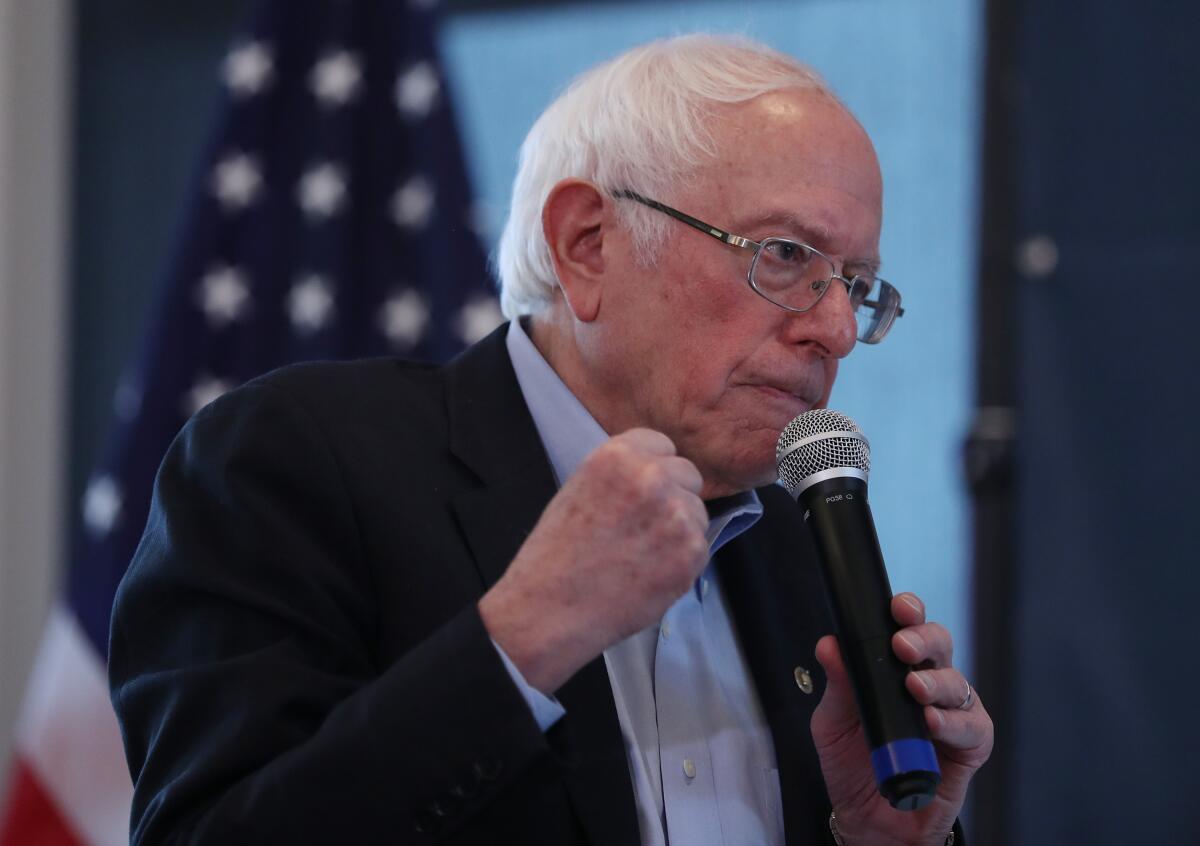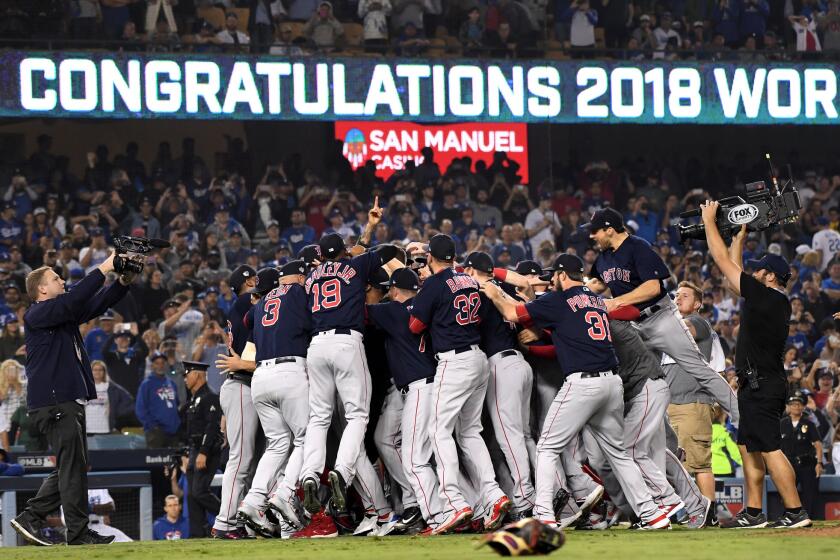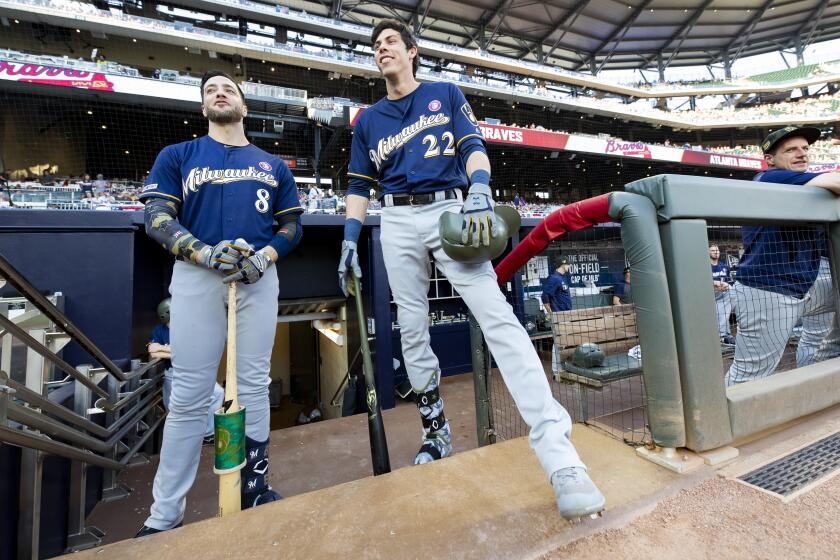Commentary: As baseball embraces efficiency, scouts and minor league teams fight to hang on

Baseball scouts and minor league teams are not alone in America. Scouts are like so many millions of American workers, victims of an industry that has found a more efficient way to do its business. Dozens of minor league teams soon could be a casualty too.
Jobs for scouts exist, but not as many as there used to be, and older scouts lose one job and struggle to find another.
In the meantime, scouts cannot pay the mortgage, or a hospital bill. Or they die, and the family cannot pay funeral expenses.
âEvery week, weâve got somebody in trouble,â Dennis Gilbert said.
Gilbert, a former agent and current Chicago White Sox executive, is the founder of the Professional Baseball Scouts Foundation. He launched the organization in 2003 â the year âMoneyballâ was published â and since then has raised more than $1 million to help scouts in need. On Saturday, the foundationâs annual fundraising gala will be held at the Beverly Hilton Hotel, with Hall of Famers Jeff Bagwell, Jim Thome, Don Sutton, Tom Lasorda and Dave Winfield among the guests.
Once upon a time, teams were owned by families. Now, teams are billion-dollar properties, increasingly owned with Wall Street money and run by investors and Ivy Leaguers.
Both teams that beat the Dodgers â the Houston Astros in 2017 and Boston Red Sox in 2018 â are under investigation for allegedly stealing signs.
Advances in video and data collection have made baseball less reliant on scouts. In the service of efficiency, scouts are collateral damage.
Same with teams on the lower rungs of the minor league ladder. We could lament the potential demise of the Missoula PaddleHeads and the Rocky Mountain Vibes as the price of progress, but not so fast.
The plan, from the view of major league owners, starts with a logical premise. Why draft hundreds of players each year who have little chance to make it to the majors, roster fodder so that the relatively few legitimate prospects can compete in rickety ballparks and wrench their bodies on the 14-hour bus ride from Missoula, Mont., to Colorado Springs, home of the Vibes?
Why not kill the rookie leagues, draft half as many players, then let them spend their first pro summer in state-of-the-art training complexes in Arizona and Florida, with easy access to the best instructors a team has to offer?
The major league owners considered this proposal as part of an opening pitch in the first days of what they believed would be a year of confidential negotiations. The minor league owners saw an existential threat and cried foul, immediately and very publicly. The major league owners lobbied for better facilities, but the minor league owners did not consider a plan to kill one of out every four minor league teams a reasonable way to address the issue.
Itâs hard to know what exactly is going on behind the scenes in baseball these days. Sign-stealing is rampant ... unless itâs not.
The grizzled scouts have Gilbert and his laudable annual fundraiser as their primary advocate.
The doomed minor league teams found an even more powerful champion, and a presidential candidate found an unlikely constituency. No shortage of local elected officials are willing to stand with a high-profile small business, and stand up to the big, bad baseball bosses.
Bernie Sanders amplified the story for a national audience. Sanders delights in telling the story of how he was mayor of Burlington, Vt., when a minor league team set up shop there, bringing affordable and enjoyable summer entertainment for all.
Baseball is as American as fireworks on the Fourth of July. For Sanders, though, an embrace of the national pastime also offered the chance to shine a spotlight on the working-class Americans and communities vulnerable to what he often brands as âcorporate greed.â
Major league owners have pledged to mitigate the loss of jobs and keep some form of baseball alive in towns where official minor league ball might die, although minor league owners have dismissed that vision as a âshell game.â
That same ethos of efficiency is the one that encourages companies to outsource jobs to lower-wage countries. And it encourages legislators to cut corporate taxes so companies can hire more workers and pay better wages, but without any requirement that companies actually hire and pay more to qualify for the tax cut.
California Strong, a non-profit foundation, raises money and awareness to support those affected by the Borderline shooting and California wildfires in 2018.
In Sanders, the endangered minor league teams have a celebrated advocate. More than 100 members of Congress are standing with him, and even that might not be enough to save those teams. For now, the major league and minor league owners have agreed to negotiate privately rather than criticize each other publicly.
The scouts have Gilbert, at least for now, and perhaps not for much longer. As the scouting cutbacks continue, he wonders who might stand for the next wave of scouts eliminated in the name of efficiency.
âIâm 70,â Gilbert said. âI had a triple bypass. I think about that all the time.â
More to Read
Go beyond the scoreboard
Get the latest on L.A.'s teams in the daily Sports Report newsletter.
You may occasionally receive promotional content from the Los Angeles Times.














